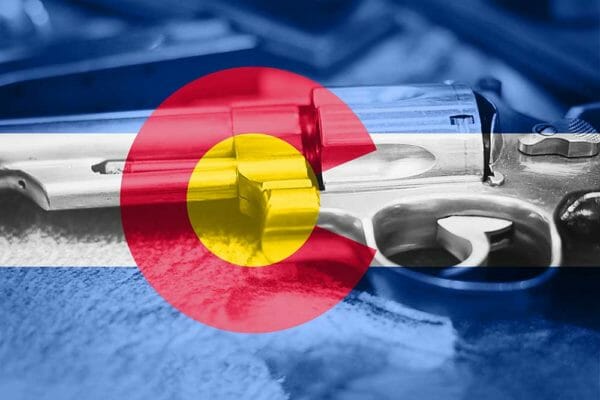
On April 10, 2025, Colorado’s Senate Bill 25-003 was signed into law by Governor Jared Polis on April 10, 2025. The passage of this bill represents one of the most significant changes to gun regulations in the state’s history. This legislation establishes a first-of-its-kind permit-to-purchase system for certain semiautomatic firearms while prohibiting rapid-fire conversion devices.
SB25-003, officially titled “Semiautomatic Firearms & Rapid-Fire Devices,” fundamentally changes how Coloradans can purchase certain types of firearms. The law criminalizes the manufacture, distribution, transfer, and purchase of specific semiautomatic weapons without proper permitting. It specifically covers the following firearms:
- Semiautomatic rifles with detachable magazines
- Semiautomatic shotguns with detachable magazines
- Gas-operated semiautomatic handguns with detachable magazines[
Importantly, the legislation does not affect most handguns (which are typically recoil-operated), shotguns with fixed magazines, or semiautomatic firearms with fixed magazines holding 15 rounds or less.
Rather than imposing an outright ban, Colorado’s SB25-003 introduces a detailed permitting process for individuals seeking to purchase certain semiautomatic firearms. Under the new law, prospective buyers must first apply to their county sheriff for a course eligibility card. This application requires a government-issued photo ID, a name-based background check, and a signed affirmation that the applicant complies with all relevant firearm laws.
Once eligibility is established, applicants must complete a firearms safety course. Those who already hold hunter education certification may take a basic four-hour course. Those without such certification must complete an extended 12-hour course conducted over at least two days. After completing the training, applicants are required to pass a final examination with a minimum score of 90 percent.
Permits issued under this process are valid for five years. Once expired, individuals must repeat the entire application, training, and testing process to obtain a new permit.
County sheriffs have significant discretion in this process and may deny applications if they have a “reasonable belief that documented previous behavior by the applicant makes it likely the applicant will present a danger to themself or others.” This aspect of the law has drawn particular criticism from gun rights advocates who view it as creating arbitrary barriers to exercising Second Amendment rights.
Furthermore, SB25-003 prohibits the purchase and sale of “rapid fire conversion devices” such as bump stocks and binary triggers. These accessories are defined as any devices that increase the rate of fire of a semiautomatic firearm above the standard rate. The possession of such devices becomes a criminal offense under the new law.
“This legislation builds on our commitment to improve public safety, reduce gun violence, uphold our freedom,” Governor Polis stated upon signing the bill.
The Colorado State Shooting Association has announced it is “actively exploring every legal option to challenge this unconstitutional law.”
In response to Polis’ signing of the law, the National Sports Shooting Foundation (NSSF) issued a strong condemnation of SB25-003. It asserted that the law violates constitutional protections by imposing undue restrictions on residents’ Second Amendment rights.
“This law is unconstitutional on its face. It is a gun control group spurred attack on the Second Amendment rights of those who follow the law,” declared Lawrence G. Keane, NSSF’s Senior Vice President and General Counsel. “Colorado lawmakers who claim Gov. Polis’ gun ban will make their state safer have yet to offer legislation that would hold criminals accountable for the criminal misuse of firearms. Instead, they violate the rights of those who obey the law.”
In a press release disseminated on April 10, NSSF outlined what SB25-003 would do to gun rights in the Rocky Mountain State.
“Colorado’s SB25-003 makes Second Amendment rights in Colorado only permissible with a state-approved permission slip. It is an attack on the lawful sale of the most popular-selling centerfire rifles in America – the MSR or AR-15 – of which there are over 30 million in circulation today. Those firearms are used for lawful purposes daily, including recreational target shooting, hunting and self-defense. SB25-003 also bans the sale of semiautomatic shotguns and pistols that can accept detachable magazines, unless lawful purchasers obtain similar approval from county sheriffs and obtain a permit-to-purchase.”
Colorado’s firearm policy landscape has evolved substantially over the past 15 years, with a notable shift toward more stringent gun control measures following the 2012 Aurora theater shooting. That mass shooting catalyzed legislative action, leading to the adoption of prohibitions on high-capacity magazines and universal background checks.
Subsequent years saw further expansions of gun control, including the 2019 implementation of extreme risk protection orders (“red flag laws”) authorizing temporary firearm removals and a 2021 mandate requiring secure storage of firearms in households.
The state’s regulatory framework strengthened in 2021 with the repeal of its firearm preemption law, which had previously prevented local jurisdictions from enacting ordinances stricter than state standards. This change enabled municipalities to craft localized firearm regulations that could exceed statewide restrictions. Building on these developments, Colorado legislators passed a mandatory 72-hour waiting period in 2023 for most firearm transfers, extending the interval between background check initiation and final transfer completion.
About José Niño
José Niño is a freelance writer based in Austin, Texas. You can contact him via Facebook and X/Twitter. Subscribe to his Substack newsletter by visiting “Jose Nino Unfiltered” on Substack.com.

from https://ift.tt/huXUY0s
via IFTTT

No comments:
Post a Comment